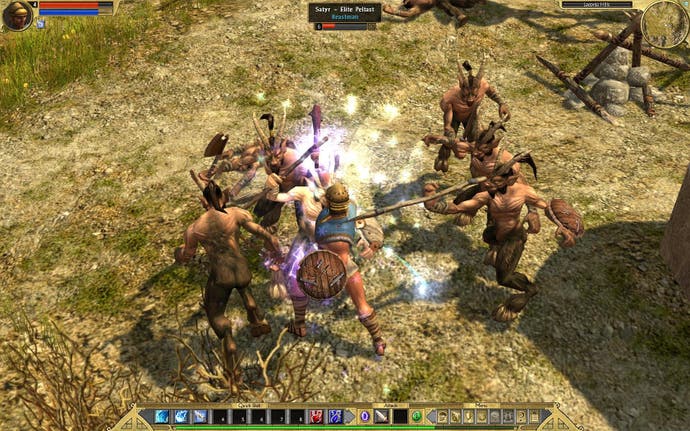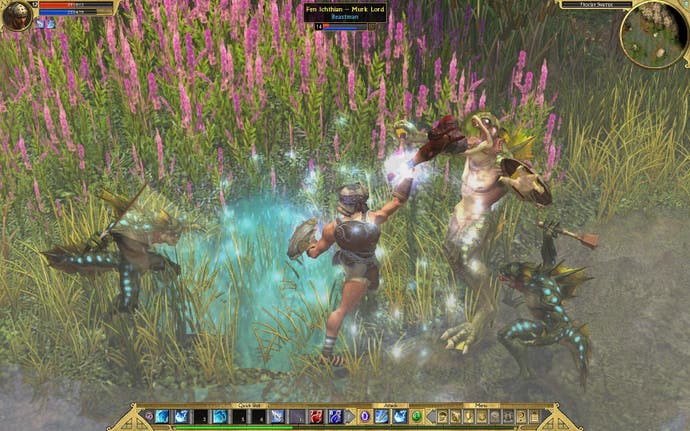Retrospective: Titan Quest
Battling the gods.
In the genre known colloquially as Diablo Clones, Titan Quest holds a special place for me, although oddly not so much for the game that was released, but more for what happened behind the scenes. Something that suggests we're trying to be God. So, since it's Sunday, why don't we see if we can find a berserk route to a teleological interpretation of videogames, via remembering a visit to Iron Lore during the game's development?
This is not to say I haven't enjoyed spending every spare second of the last week hacking and slashing my way through ancient history, collecting ludicrous amounts of loot, slaughtering thousands of creatures whose only crime was being on my path.
What a developer needs to get right in this seemingly simple style of game is subtle, and for the most part Titan Quest understands the nuance. It's about the comforting routine of repetition, an endless sense of progression without barriers. You hack through the field to the cave to the bridge to the next town. Sell your loot, exchange completed quests for fresh, and repeat.

In fact, if anything the format gets more simplified with each generation. Titan Quest, at four years old, has no easy way for getting rid of a full inventory mid-quest. Last year's Torchlight lets your pet go do that. In Titan Quest you have to go to all the effort of laying down a portal stone and teleporting back to the previous town. What am I? Their slave?
The process is so simple that it's soothing. I alternate between my left and right click attacks, occasionally firing off another special skill from the number keys, and I ceaselessly win. I level up, I find a better helmet or club, I gather gold and potions, I defeat armies. Should I die it's likely because I ran out of health drinks mid-battle rather than because the odds were insurmountable. It's so calm, so soothing, that I find I'm able to multitask around it. Put a TV programme on the other monitor and both can be enjoyed simultaneously.
The Sullivans
Five years ago, a year before Titan Quest was released, I went to Boston to visit developers Iron Lore. The game was still very much in little pieces, scattered around the office, being meticulously stitched together by a fantastic team. Boss Brian Sullivan had created his studio by handpicking developers and designers he found interesting, a combination of old hands and - interestingly - a selection of young former Nintendo game developers.
Amongst the veterans was artist and animator Rich Sullivan (no relation), formerly of Looking Glass, who had a corner of the office unlike any other I've seen, combining technologies covering tens of thousands of years of techniques from state-of-the-art tablets to the crude tools of sculpture. Having spent some time working in animation he told me that he'd been forced to learn the more modern methods, but would always insist on beginning his character design in clay. Extraordinary sculptures surrounded him, from pristine Roman helmets to grotesque, distorted, monstrous faces.

I commented on the small, stop-motion-style figurines stood about his monitor, and asked if Ray Harryhausen was a big influence. He looked at me with both tired joy and relief, opining that these young people he was working with had never even heard of Harryhausen, let alone seen his films. He would, during lunch breaks, force them to sit and watch Jason And The Argonauts or The 7th Voyage of Sinbad. Educate them.
There was passion in this team.
Playing God
One of those passions was to be developing a community. And central to this was the level editor.
I'm not a modder, and I don't have any significant experience with level editors, so forgive my ignorance on the matter. But watching a Titan Quest level be created was something of a revelation. The editor was built so that you could paint levels into existence, which enormously appealed to me. Frightening wireframe boxes have never let me get past a corridor in most editors, but here the guy was waving his wand on the tablet and it was appearing before him.
He began with a black void, into which appeared a mass of rock, soon covered by his painting in the sea. Once it was covered in water, he then picked out a tool to allow the formation of land, which was risen from the waters, shaped and crafted into an island. Then he dressed that island in grass textures, trees, rocks. This was then brought more to life with animals on the ground and fish creatures in the water. Finally he added a player character. And it was good.








